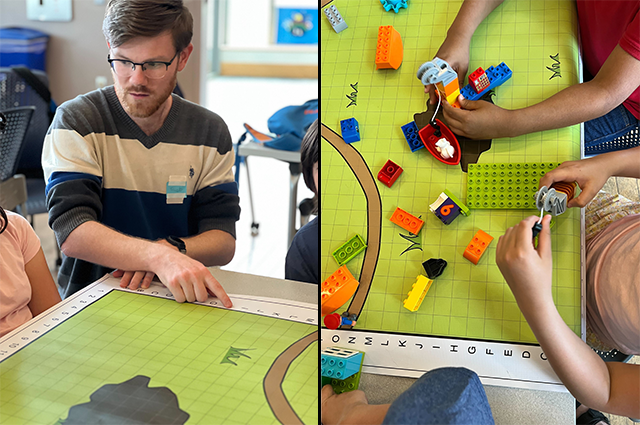Local students dive into engineering workshops

By Cansu Birsen, E25
After experiencing an emergency shutdown of its school building in early June due to structural damage, Somerville’s Winter Hill Community Innovation School (WHCIS) found refuge and community support on Tufts University’s Medford/Somerville campus. With only seven days of the school year remaining, Tufts’ Olin Hall served as the temporary home to four hundred students, teachers, and staff from the PK-8 innovation school through the end of their academic year.
WHCIS middle school science teacher Melissa Moore, A16, is a Tufts alum who participated in the Tufts Center for Engineering Education and Outreach’s (CEEO) community outreach during her days at Tufts. Despite the adversity facing the Winter Hill school community, Moore recognized an opportunity within the challenges and reached out to Tufts CEEO. That outreach paved the way for an innovative engineering program to be offered to the displaced students, turning a difficult situation into a transformative experience.
The three-day program organized by Tufts CEEO offered six workshops a day for students in grades 1-8, engaging more than 300 Winter Hill students. The elementary and middle school students spent these three days rotating through Aidekman and Sophia Gordon Halls, where they took part in various engineering activities depending on their grade level. Younger students designed chairs out of craft materials and LEGO bricks for their clients – stuffed teddy bears. Meanwhile, older students did the Map Mats or the Silly Walking LEGO Robot activity. The Map Mats activity required students to use mapping coordinates to help LEGO figures travel to different locations on mats with various settings printed on them, while the goal behind the Silly Walking activity was to build a moving robot without any wheels. All activities inspired students to come up with creative designs and encouraged them to think about scientific concepts like product design, mechanics, and movement.
Undergraduate employees from Tufts CEEO led the engineering workshops for the WHCIS students, with four undergrads present at each workshop. Child study and human development major Marissa Zelten, A25, was among the Tufts students supporting the workshops. “It was so cool to see all [the students’] excitement about robotics and engineering, even on their second-to-last day of school!” says Zelten. “They made such creative designs and worked so well collaboratively, sharing ideas and giving each other feedback.”
With the Winter Hill Community Innovation School’s population of English language learners in mind, Tufts CEEO was fortunate that many of its summer undergraduates spoke multiple languages. Tufts mechanical engineering major Migdalia Lopez-Jimenez, E25, says, “The [Winter Hill] students opened up easily and weren't afraid to try different ideas and ask questions in any of the three languages we could help them in: English, Spanish, and Portuguese. Many of the students in the 7th and 8th grade groups were from familiar places back home and they felt seen and understood, which made them more engaged and open to trying the activity.”
Teachers from Winter Hill saw the enthusiasm of their students, especially in working with multilingual Tufts undergraduate volunteers. “My students had an unbelievable experience with the CEEO while we were temporarily placed at Tufts,” says Tara Murphy Beardsley, a middle school science teacher at the Winter Hill Community School. “They couldn't stop talking about how the volunteers spoke their languages and how smart they were. They truly saw themselves as future scientists/college students in the multilingual students that worked with them.